American
Whiskey:
BELMONT FARMS of
VIRGINIA
Virginia Lightning
Corn Whiskey
Copper Fox Spirit
June, 2005
In 1975, Chuck and Jeanette Miller bought the farm. The 200 acres they own near Culpeper, Virginia, has carried the name "Belmont Farm" since 1830 and they
felt no need to change it. In the ensuing thirty years the Millers raised corn, cattle, thoroughbred
horses, four sons, a daughter, at least one Corgi dog, and for awhile,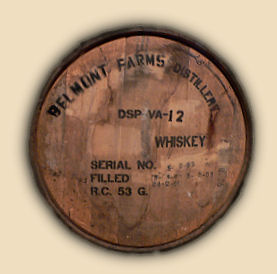 some grapes. The grapes, only about an acre of them, were planted in 1985
with the idea of making wine. Mother Nature, however, had some
some grapes. The grapes, only about an acre of them, were planted in 1985
with the idea of making wine. Mother Nature, however, had some
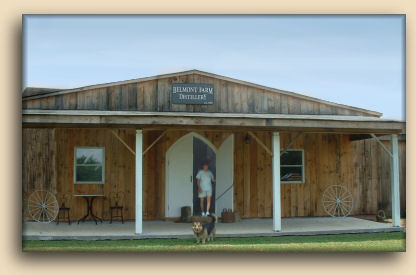 ideas
of her own, such as early and unpredictable frosts. After being slammed
with low yields a few times, Chuck, still thinking in terms of specialty
beverages, decided to look in other directions.
ideas
of her own, such as early and unpredictable frosts. After being slammed
with low yields a few times, Chuck, still thinking in terms of specialty
beverages, decided to look in other directions.
One of those directions didn't require
much looking. Back in the Prohibition '20s and '30s, the great American
tradition of do-it-yourself corn whiskey was flourishing. And the
resulting flow of illegally-made
alcohol included a very tiny contribution from Chuck's grandfather in
Maryland. Tiny for the Great Tradition, perhaps, but big enough to support
John Miller's family. Of course, it couldn't last forever, and it didn't.
Although he was wasn't imprisoned, Grandpa Miller was eventually caught
and had to shut down his distilling operations.
While uprooting his grapevines, Chuck, who has his grandfather's original recipe, began having some serious thoughts concerning how to go about distilling and selling corn whiskey... legally.
In 1989 he applied for, and obtained,
a federal license from the Bureau of Alcohol, Tobacco, and Firearms, as
well as another from the Commonwealth of Virginia, and yet another from
the Federal Food and Drug Administration, to ferment and distill corn
whiskey in his barn. He also obtained a distribution contract with the
Virginia Alcohol Beverage Control organization.
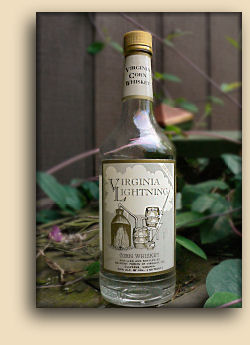 The Millers' products,
Virginia Lightning (a clear 100-proof corn whiskey) and Copper Fox (a
wood-aged spirit made from corn whiskey), have been sold throughout
Virginia since the late 1980's in the state-operated liquor stores. Early
attempts to sell Virginia Lightning in other states were less than
successful, however, until they realized that North Carolinians and
Tenne
The Millers' products,
Virginia Lightning (a clear 100-proof corn whiskey) and Copper Fox (a
wood-aged spirit made from corn whiskey), have been sold throughout
Virginia since the late 1980's in the state-operated liquor stores. Early
attempts to sell Virginia Lightning in other states were less than
successful, however, until they realized that North Carolinians and
Tenne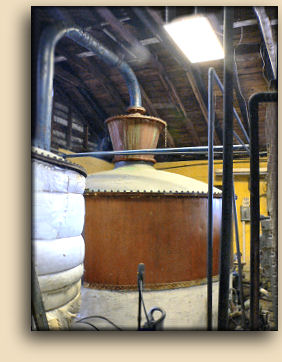 sseans weren't
much interested in "Virginia" whiskey. So they market
their product as "Carolina Lightning" in North and South Carolina, and as
"Tennessee Lightning" in Gatlinburg, which is where we first discovered
it. The fact that their operation has been featured on both The History
Channel and PBS Television has also helped it become familiar to Americans
who otherwise would not think of themselves as "moonshine-savvy". Chuck's
operation is very traditional for producing fine corn whiskey. They are
corn farmers, and like the true farmer-distillers who first settled the
Shenandoah Valley and Kentucky, they actually grow the corn from which
their whiskey is made. The Belmont Farms still itself is a huge, solid
copper commercial pot still, built right after the end of Prohibition in
1933, which Chuck says he obtained from a wooded hillside near
Charlottesville. The Millers' operation, which produces about 250 cases
per acre, or 2,000 cases
a year, starts by boiling 300 pounds of ground corn with purified water
for 45 minutes, cooling it down, and adding yeast. In a separate tank,
Chuck heats another ton of corn, without yeast, and then they are combined
in a third tank to produce 1,500 gallons of mash from which the whiskey
will be distilled. This produces pure corn whiskey, without any rye or malted
barley. And the result, even when diluted to the 100 proof it's bottled
at, has a bright corn flavor unequalled by almost any other corn whiskey
we've tried, even Heaven Hill's "Shine On, Georgia Moon" (which we find to
be better-tasting than the original version actually made years ago by
the Johnson Distillery in Albany, Georgia).
sseans weren't
much interested in "Virginia" whiskey. So they market
their product as "Carolina Lightning" in North and South Carolina, and as
"Tennessee Lightning" in Gatlinburg, which is where we first discovered
it. The fact that their operation has been featured on both The History
Channel and PBS Television has also helped it become familiar to Americans
who otherwise would not think of themselves as "moonshine-savvy". Chuck's
operation is very traditional for producing fine corn whiskey. They are
corn farmers, and like the true farmer-distillers who first settled the
Shenandoah Valley and Kentucky, they actually grow the corn from which
their whiskey is made. The Belmont Farms still itself is a huge, solid
copper commercial pot still, built right after the end of Prohibition in
1933, which Chuck says he obtained from a wooded hillside near
Charlottesville. The Millers' operation, which produces about 250 cases
per acre, or 2,000 cases
a year, starts by boiling 300 pounds of ground corn with purified water
for 45 minutes, cooling it down, and adding yeast. In a separate tank,
Chuck heats another ton of corn, without yeast, and then they are combined
in a third tank to produce 1,500 gallons of mash from which the whiskey
will be distilled. This produces pure corn whiskey, without any rye or malted
barley. And the result, even when diluted to the 100 proof it's bottled
at, has a bright corn flavor unequalled by almost any other corn whiskey
we've tried, even Heaven Hill's "Shine On, Georgia Moon" (which we find to
be better-tasting than the original version actually made years ago by
the Johnson Distillery in Albany, Georgia).
Making whiskey was a nice hobby and side-business for the Millers (the
main purpose of their farm is the raising of Jeanette's prize thoroughbred
horses), but especially since the national television exposure, it's fame
is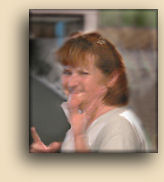 spreading fast. Chuck, who holds an aviation engineering degree from
the University of Maryland, is now gearing up for an onslaught of
distillery tourists. He and Jeanette are rehearsing their tour-ta
spreading fast. Chuck, who holds an aviation engineering degree from
the University of Maryland, is now gearing up for an onslaught of
distillery tourists. He and Jeanette are rehearsing their tour-ta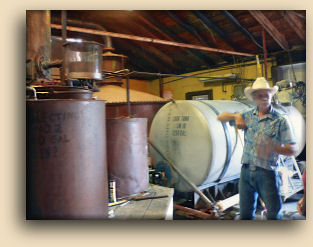 lk (we
have a chance to be practice-tourists for them) and have built a
beautiful, herringbone paneled front extension onto the barn. This will
be the tasting and souvenir room at the end of the tour, although they
still need to push for legislation to allow them to offer samples and sell
product onsite. They are, in fact, negotiating to get signs on the nearby
interstate and local roads and working on the logo by which the distillery
will be known to tourists, a process we get to watch, as we sit with them
and the sign consultant around their kitchen table, sipping lemonade.
lk (we
have a chance to be practice-tourists for them) and have built a
beautiful, herringbone paneled front extension onto the barn. This will
be the tasting and souvenir room at the end of the tour, although they
still need to push for legislation to allow them to offer samples and sell
product onsite. They are, in fact, negotiating to get signs on the nearby
interstate and local roads and working on the logo by which the distillery
will be known to tourists, a process we get to watch, as we sit with them
and the sign consultant around their kitchen table, sipping lemonade.
In addition to the white corn whiskey, the Millers market an aged product
called "Copper Fox". The way they do this is to make a large "tea bag" of
cheesecloth and stuff it with toasted and charred wood chunks, and allow
it to steep in the newly-made whiskey until the clear 'shine has picked up
the color and flavors of the wood. Chuck uses cut-up old oak barrel
staves, and he also uses chunks of charred applewood. After several weeks,
the whiskey is put into previously used charred oak barrels and aged for
at least two years. This additional barrel aging has been going on for
several years now, but the label still claims only four m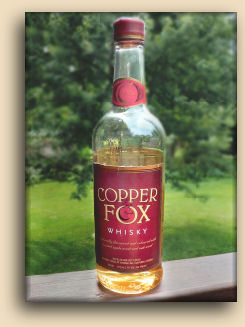 onths
"aging". Chuck says he'll get around to updating the label eventually.
onths
"aging". Chuck says he'll get around to updating the label eventually.
Copper Fox's name may have been influenced by the popu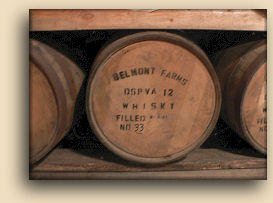 lar
nickname for Virginia Gentleman's premium label, which uses a very similar
fox head logo molded into their bottle. That would be understandable, as
Chuck and A. Smith Bowman's master distiller Joe Dangler are friends who
share ideas and even bottling equipment. While the label on the Millers'
flagship product may seem slightly frivolous, the Copper Fox label is
quite distinguished and professional-looking. The wording on the back,
however, has the same bounce and fun that we hear in Chuck's own voice.
The whiskey also conveys that un-stuffy feeling.
lar
nickname for Virginia Gentleman's premium label, which uses a very similar
fox head logo molded into their bottle. That would be understandable, as
Chuck and A. Smith Bowman's master distiller Joe Dangler are friends who
share ideas and even bottling equipment. While the label on the Millers'
flagship product may seem slightly frivolous, the Copper Fox label is
quite distinguished and professional-looking. The wording on the back,
however, has the same bounce and fun that we hear in Chuck's own voice.
The whiskey also conveys that un-stuffy feeling.
John says that if you close your eyes when drinking Copper Fox, you can imagine yourself sitting around a campfire, toasting S'Mores.
There would be campfire songs, too.
Probably a little more "Knick-knack, Paddywhack" than "Cumbahyah".
![]()
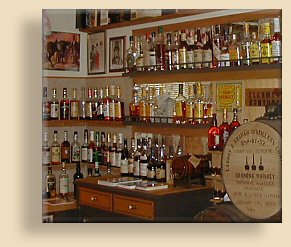 |
|
Story and original photography copyright © 2005 by Linda Lipman and John Lipman. All rights reserved. |


